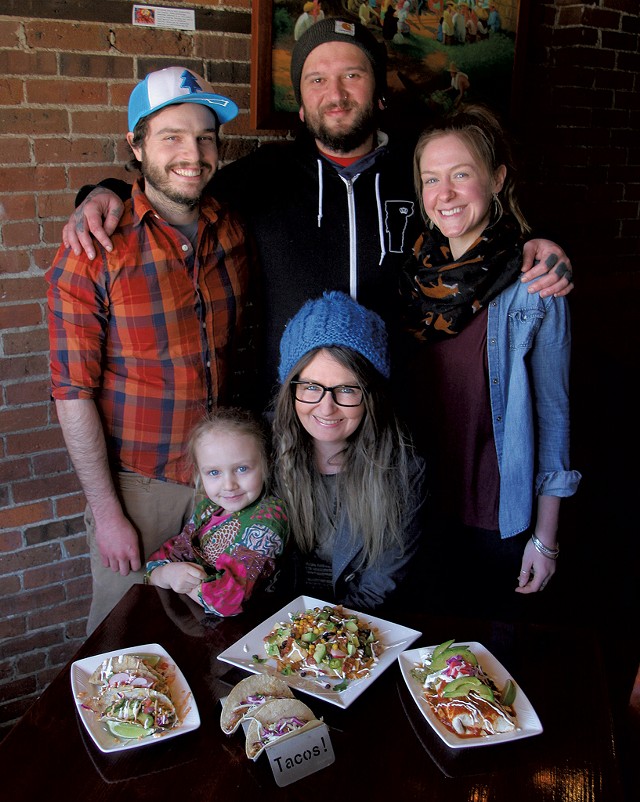
- Robert Jenks
- Clockwise from left: Justin Newland, Adnan Terzic, Breanna Stewart, Tanika Stewart and Tanika's daughter
What do restaurants have in common with bears, skunks, bumblebees, snakes, box turtles and snails? This winter, they're hibernating.
For animals, hibernation is a way to conserve energy and survive the winter, when resources are scarce. It's the same for restaurants. Closing for a few months during the cold, harsh pandemic winter is a way to save money — cutting inventory, payroll, utilities and other variable operating costs. And it might be just what some restaurants need to make it through to brighter days.
So far, Vermont has largely been spared the devastating mass closures that other states and large cities have witnessed during the pandemic. Matt Birong, chef-owner of 3 Squares Café in Vergennes and a Democratic state representative, explained that Vermont's unique action in targeting independently owned businesses — including restaurants — with its economic relief grants "has saved countless businesses."
"Not a lot of states did that," Birong continued. Now, as restaurants wait for the second round of Paycheck Protection Program loans to hit their bank accounts — and hope for further industry support from the government — some are using short-term closures to ensure their long-term survival.
"It's a bizarre concept," Birong said. "But people are making pragmatic decisions that will actually increase the survivability of the businesses."
Seven Days took a closer look at his and two other Vermont restaurants that are sitting out the winter. (For a beer brewer's perspective, see "Hill Hiatus" below on Hill Farmstead Brewery's decision to take a break.)
3 Squares, Three Scenarios
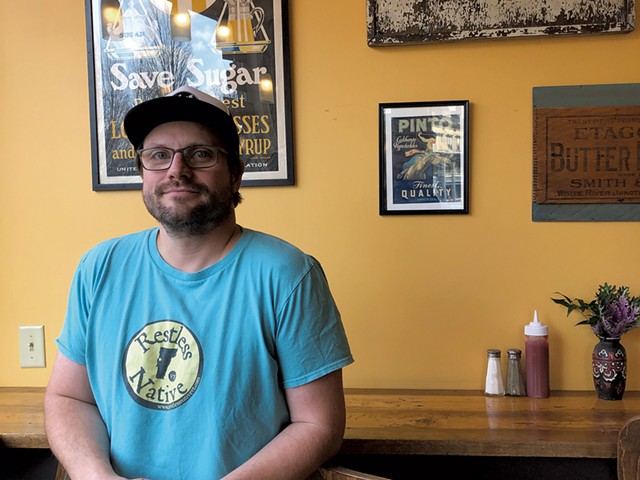
- File: David Holub
- Matt Birong
Birong recognized the possibility that his own restaurant might hibernate when 3 Squares Café first reopened in June.
"We worked out three different scenarios of what winter would look like, but in June nobody knew what was going to happen," he said. No. 1 was operating in a semblance of normalcy. No. 2 worked with the state's 50 percent cap on indoor dining capacity. No 3 was the most extreme: "If things get really dark with the cash flow, we're just hitting the pause button," Birong explained.
Over the summer, things were going pretty well for the casual, eclectic restaurant on Vergennes' Main Street — it was breaking even. But in the last week of October, "It just tanked," Birong said.
COVID-19 case numbers were rising, and cooler weather brought outdoor dining to an end. Then, beginning November 14, Gov. Phil Scott restricted restaurant occupancy to one household per table.
"We blew through about $45,000 of grant money in November and December," Birong said. "There were days where I was standing in my kitchen just staring at the printer, waiting for a ticket to spit out, lighting [proverbial] hundred-dollar bills on fire."
It was pretty clear which scenario 3 Squares had to choose. On December 29, the restaurant announced it would go into hibernation "for at least the next two months," beginning January 1.
The last-minute announcement was strategic: Birong was waiting to make sure the federal government would reinstate the extra $300 a week in unemployment benefits so that his longtime staff would be financially stable during the closure. "If that didn't come through, we would have stayed open and just dealt with it," he said.
The temporary closure is saving the café roughly $12,000 a month. There are still ongoing costs — rent, utilities, bank loan payments — totaling about $8,000 a month. But cutting expenses by more than half is huge for the long-term health of the business. Birong summed it up as "a more responsible, diligent way to use the support that we were receiving."
It was strange to be closed for the restaurant's 14th anniversary, Birong noted, but he's confident his customers will return when 3 Squares opens again — likely in mid-March. In the meantime, he's happy to see the community supporting new restaurants in town, including Rockers Pizzeria and the recently reopened Vergennes Laundry.
"I think it's actually going to help the downtowns and village centers [avoid] having a series of empty storefronts," Birong said of the temporary closures. "COVID is proving that survivability is more about the long game than anything else."
Turning Bleu
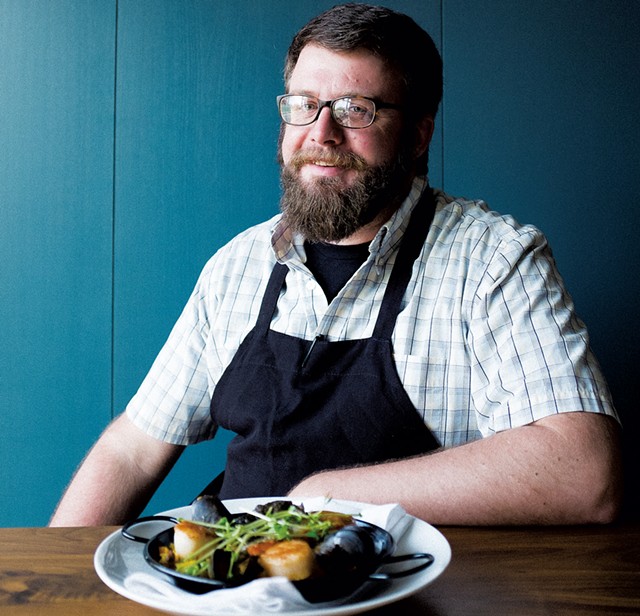
- File: Corey Hendrickson
- Doug Paine
Bleu Northeast Seafood quietly rebranded in December 2020, changing its name to Bleu Northeast Kitchen. The restaurant still serves seafood, but the new menu offers a wider variety of dishes focused on local farm products.
Diners wanting to check out the Misty Knoll chicken roulade or the Bleu burger will have to wait, though. The restaurant in the Marriott-brand Courtyard Burlington Harbor hotel — part of the Westport Hospitality group that also includes Hotel Vermont's Juniper bar and restaurant and Brick Outdoor Kitchen & Bar — went into hibernation on January 3. The exact reopening date remains undecided, though Bleu's website promises, "See you in March!!"
Bleu was closed for the first few months of the pandemic last year, then reopened for in-person dining in early summer with a limited menu and small staff. But with new outdoor restaurant Brick open all summer long right next door, indoor dining wasn't popular — and with Bleu's fish-forward menu, takeout wasn't a practical option. Also, about half of Bleu's diners are hotel guests, and those numbers were down due to travel restrictions and reduced occupancy rules.
"Business was never really strong," executive chef of Westport Hospitality Doug Paine told Seven Days. "As fall was winding down, it became pretty apparent that our customer base [at Bleu] was going to be very limited once everybody started to come back inside."
For efficiency's sake, the restaurant group decided to close Bleu temporarily and steer its efforts and resources toward Juniper.
Bleu is the kind of sit-down, fine-dining restaurant where customers linger over their meals, Paine said. Juniper is more casual. Its floor plan is open and flexible, spilling into the Hotel Vermont lobby, so it's easier to space out the tables for social distancing. Plus, Juniper's outdoor terrace draws bundled bar-goers even on frigid winter days, thanks to a roaring firepit and menu of hot toddies.
"With [fewer] places open in town, it does consolidate business a little bit," Paine said. "Juniper has actually been somewhat steady. It's not all bleak news."
Even though Bleu is closed, it isn't totally empty. The kitchen's layout is ideal for streamlined production, and the team is using it to prepare meals for the Vermont Everyone Eats program, which temporarily resumed on January 18.
"I feel fortunate to be part of this larger hotel restaurant group," Paine said. "It really helps to have multiple outlets and spaces that can be fitted to what's working."
A Whole New World
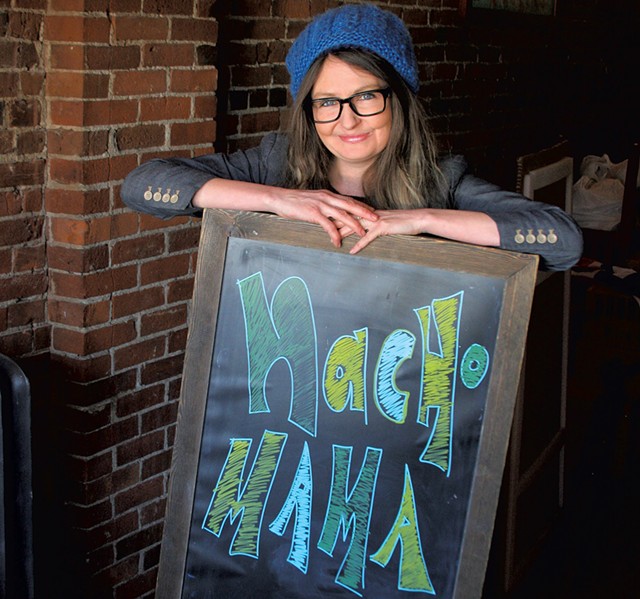
- Robert Jenks
- Tanika Stewart
When George Sales opened Pica-pica Filipino Cuisine in 2017, he hoped his lumpiang Shanghai, kare-kare and pinakbet would kick off a global trend in St. Johnsbury.
"I really wanted to showcase not only Filipino food, but promote more choices, more authentic dining in the area," Sales said.
Pica-pica closed after service on December 23 for an extended winter break. Shutting down during the slow season isn't new for Sales; he's done it every year, though the breaks became shorter as the restaurant gained traction.
But in a unique arrangement this winter, Sales is making sure St. Johnsbury residents still have access to flavors from around the world while Pica-pica is closed: He's letting Nacho Mama take over the space for five weeks, charging the owners only the cost of electricity and gas.
Nacho Mama has been a presence on the pop-up and events scene around the Northeast Kingdom since Tanika Stewart and her sister, Breanna Stewart, started selling tacos at Red Barn Brewing in 2016. The brewery had just opened next door to Tanika's house in Danville, and its owners were looking for someone to serve food.
"Three beers in, Justin [Newland, Tanika's partner] basically offered me up," she recalled with a laugh. "I got my food vendor's license real, real fast." (Red Barn moved to a new brewery and tasting room on Route 2 in Danville in 2020.)
Nacho Mama is known for "global tacos," serving everything from bánh mì to buffalo chicken in taco form. Those flavors are a nod to their father, who owned the Harvest Sun Café in St. Johnsbury when the sisters were growing up. The menu also features traditional tacos inspired by their stepfather, who is from central Mexico.
During the pandemic, many of Nacho Mama's usual pop-ups and catering gigs have been canceled, and the Stewart sisters found themselves at a standstill. They'd considered opening a permanent restaurant but were hesitant.
"When you're starting a restaurant, you have to take such a leap of faith," Tanika explained. "You can do pop-ups and people will come eat your food, but do you have what it takes to bring people in every single day of the week?"
A chance conversation between Sales and Adnan Terzic — who works at Pica-pica and is also Tanika's co-chef at Nacho Mama — got things rolling.
"When the opportunity to collaborate came up, I thought it was an excellent way to help them get their foot in the door," Sales said. He decided to let Nacho Mama use the restaurant space for five weeks — through February 15 — to test its business model.
On each of the first three days, Nacho Mama sold out in an hour and a half. The tacos attracted their pop-up regulars, as well as new customers. Some have driven from 40 minutes away, Tanika said, in search of good Mexican food in an area where it's scarce.
"This is definitely the affirmation we needed in order to feel confident about moving forward towards a brick-and-mortar," she said. "In a climate where things are so grim and gray, especially in the food industry, this opportunity has been purely overwhelming."
In the meantime, Sales is making the most of his hibernation, sourcing new ingredients and inspiration for Pica-pica. Despite the challenges of the pandemic — and problems that predated it, such as staffing shortages, endemic in the rural NEK — he's optimistic about his restaurant's future.
"A lot of entrepreneurs and business owners are ready to throw their hat in," Sales said. "But for me, I see this as an opportunity to prep for the upswing."
— J.B.
Hill Hiatus
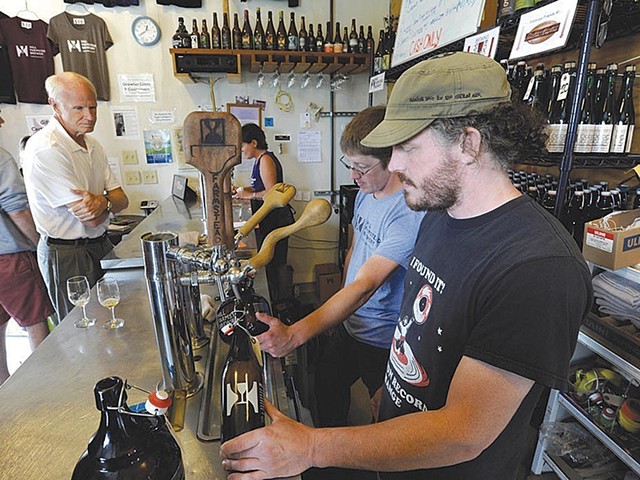
- File: Jeb Wallace-Brodeur
- Hill Farmstead Brewery
In early January, Hill Farmstead Brewery of Greensboro announced it would be going into "short winter hibernation mode (code name: Liminal Intermission)" from mid-January until late March and expects to reopen its retail operation in early to mid-April.
A statement posted on the company's website said, "This presents a rare and appreciable opportunity ... a much-needed restorative regeneration period." In addition, the announcement noted that the break would provide staff an opportunity for professional and personal development, "a sabbatical, of sorts."
At the start of 2020 — the brewery's 10th anniversary year — RateBeer named it the best brewery in the world for the fifth consecutive year.
Almost since its founding, Hill Farmstead has commanded respect and attention within the craft beer world. In 2013, the brewery swept the influential annual RateBeer rankings for top brewery, new releases and best beers by style. "Quietly, off a dirt road in rural Vermont, Hill Farmstead founded a revolutionary kind of brewing for beer aficionados with a new aesthetic...," said RateBeer's founder, Joe Tucker, according to a 2013 CraftBeer.com article.
(See "Small Wonder" about Wunderkammer Bier, now Wunderkammer Biermanufaktur, which brewer Vasilios Gletsos started as a side project while working at Hill Farmstead.)
Last January, Hill Farmstead employee Phil Young told Seven Days that the brewery team was too busy "to sit down and reflect" on the recent accolades.
Unexpectedly, 2020 brought the crew plenty of time for reflection.
On March 25, the brewery temporarily shuttered its tasting room, a top destination for beer lovers from around the world. It offered limited curbside retail sales from April 20 to January 15 this year. Hill Farmstead's sold-out Friendships and Explorations Festival, an anniversary celebration originally planned for June 13, 2020, was first tentatively rescheduled for August 2020, then for August 2021.
From a peak of 27 employees in April, Hill Farmstead slashed payroll to four, one of whom was founder-owner Shaun Hill. The company has gradually rehired six for a current total of 10, spokesperson Bob Montgomery wrote in an email.
Employees are spending their hiatus exploring "various professional and personal growth pursuits, including certifications, health and wellbeing practices and more," Montgomery wrote. They hope to share some of these experiences via the brewery's social media accounts, he added.
— M.P.





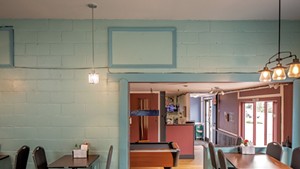








Comments
Comments are closed.
From 2014-2020, Seven Days allowed readers to comment on all stories posted on our website. While we've appreciated the suggestions and insights, right now Seven Days is prioritizing our core mission — producing high-quality, responsible local journalism — over moderating online debates between readers.
To criticize, correct or praise our reporting, please send us a letter to the editor or send us a tip. We’ll check it out and report the results.
Online comments may return when we have better tech tools for managing them. Thanks for reading.